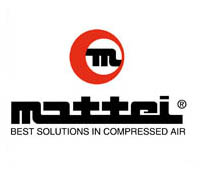- Contact 0870 350 7767
- |
- Advertise
Home > Mattei Compressors Ltd > Vane versus screw compressors – which wins?
Vane versus screw compressors – which wins?
 News and PR from Mattei Compressors Ltd - Published 06 June 2014
On today’s market, there are two main types of industrial rotary compressor – vane and screw and although both are designed to produce the same output, they differ considerably in terms of efficiency.
News and PR from Mattei Compressors Ltd - Published 06 June 2014
On today’s market, there are two main types of industrial rotary compressor – vane and screw and although both are designed to produce the same output, they differ considerably in terms of efficiency.
Rotary-vane compressors
How they work – A rotary-vane compressor comprises a rotor, with slots along its sides which house individual sliding vanes.
This assembly is offset within a cylinder, or ‘stator’, and rotates on white-metal bushes. As the rotor turns on its axis, the vanes are pushed against the stator wall by centrifugal force and the air is compressed.
Their efficiency – Lubrication keeps the freely moving vanes in constant contact with the stator’s internal surface, so the air seal is near perfect. Plus, to lubricate the moving parts and cool the air during compression, oil is injected into the stator. This efficiently seals clearances between the rotor, stator and end covers. It all helps make rotary-vane compressors the more energy-efficient compressor.
Screw compressors
How they work – A screw compressor has two parallel rotors which intersect along their sides. Replaceable roller bearings fitted into a stator maintain the rotors’ minimum clearance. During rotation, the intermeshing rotors compress the air.
Their efficiency – Screw compressors have an inherent ‘blowhole’. This forms where the rotors’ external profiles meet, driving air under high pressure to areas of lower pressure. Makers have tried to reduce the effect, but it’s impossible to eliminate completely.
The verdict
Vane compressors typically run at lower speeds than relatively leaky screw machines. For example, MatteiÂ’s fixed-speed Maxima operates at 1,000rpm, versus the average screw compressorÂ’s 3,000rpm or higher. Rotary-vane machines also have direct drive coupling which consumes less energy.
Each technology produces the same end result. But, in our opinion, in almost all conditions, vane compressors use less energy than their screw counterparts.
WhatÂ’s more, the white metal bushes in vane designs donÂ’t need to be replaced as part of scheduled maintenance programmes. So you can be confident these systems will serve you longer.
How they work – A rotary-vane compressor comprises a rotor, with slots along its sides which house individual sliding vanes.
This assembly is offset within a cylinder, or ‘stator’, and rotates on white-metal bushes. As the rotor turns on its axis, the vanes are pushed against the stator wall by centrifugal force and the air is compressed.
Their efficiency – Lubrication keeps the freely moving vanes in constant contact with the stator’s internal surface, so the air seal is near perfect. Plus, to lubricate the moving parts and cool the air during compression, oil is injected into the stator. This efficiently seals clearances between the rotor, stator and end covers. It all helps make rotary-vane compressors the more energy-efficient compressor.
Screw compressors
How they work – A screw compressor has two parallel rotors which intersect along their sides. Replaceable roller bearings fitted into a stator maintain the rotors’ minimum clearance. During rotation, the intermeshing rotors compress the air.
Their efficiency – Screw compressors have an inherent ‘blowhole’. This forms where the rotors’ external profiles meet, driving air under high pressure to areas of lower pressure. Makers have tried to reduce the effect, but it’s impossible to eliminate completely.
The verdict
Vane compressors typically run at lower speeds than relatively leaky screw machines. For example, MatteiÂ’s fixed-speed Maxima operates at 1,000rpm, versus the average screw compressorÂ’s 3,000rpm or higher. Rotary-vane machines also have direct drive coupling which consumes less energy.
Each technology produces the same end result. But, in our opinion, in almost all conditions, vane compressors use less energy than their screw counterparts.
WhatÂ’s more, the white metal bushes in vane designs donÂ’t need to be replaced as part of scheduled maintenance programmes. So you can be confident these systems will serve you longer.




